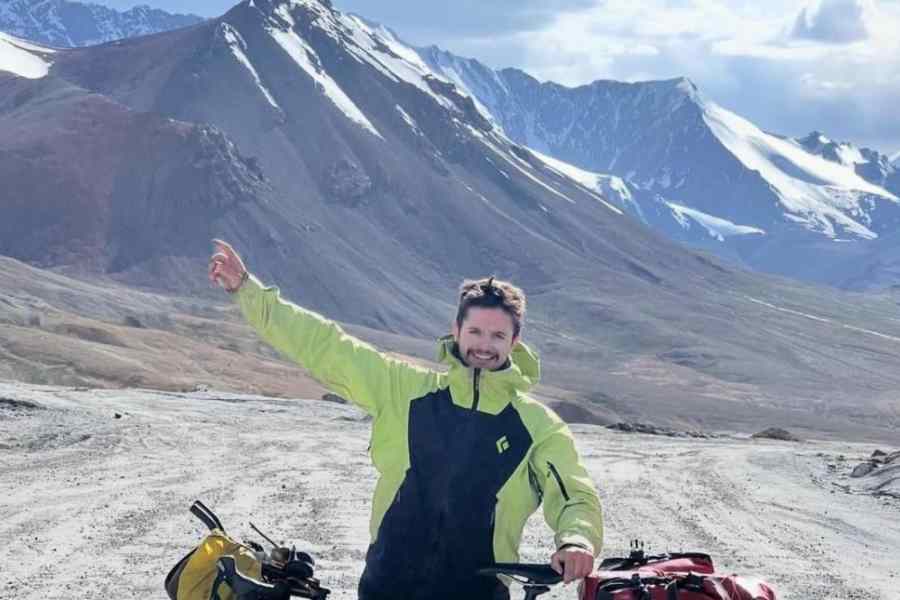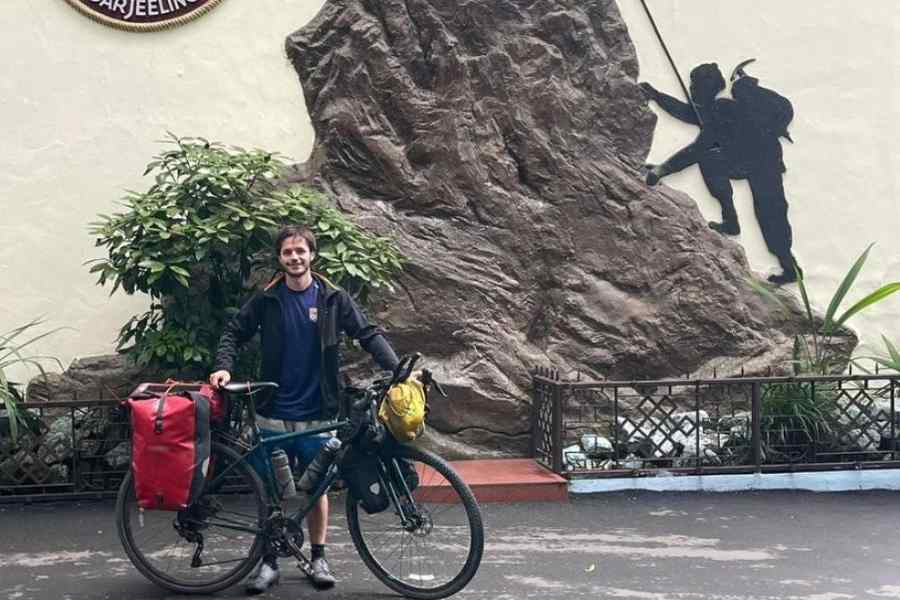A standard medical test is normally the most arduous challenge one needs to tackle to join the Darjeeling Himalayan Mountaineering Institute’s basic training course.
Vincent Hiron had to endure imprisonment in Russia as a suspected spy before he could enrol.
The 26-year-old French civil engineer and cycling enthusiast had chosen to pedal across 24 countries and 14,000km — a journey that took six months — to make it to Darjeeling to sign up for the course this autumn.
Why didn’t he just catch a flight? Hiron had several reasons.
“I have always enjoyed pushing my limits. I also decided against taking a flight for ecological reasons. Besides, cycling also helps discover cultures,” he told The Telegraph on Sunday over the phone from Kathmandu, where he is holidaying before he returns home.
The Himalayan Mountaineering Institute (HMI) course, which stretched from September 20 to October 17, included ice climbing, crevasse rescue, map reading and rappelling as well as absorbing knowledge about mountaineering.

Vincent Hiron at the Ak-Baital Pass in Tajikistan. Sourced by The Telegraph
Hiron’s six-month journey that began in February — he has taken a year’s sabbatical from work — was full of adventure.
“I was jailed in Russia for two days and interrogated by intelligence officials as they suspected I was a spy. I suffered a bout of food poisoning in Uzbekistan,” he said.
“Cycling for two weeks in Tajikistan along the Pamir Highway was a challenge, so was escaping the street dogs that chased me in Turkey.”
Hiron was jailed in Russia as French President Emmanuel Macron had been quoted in the media as saying his country would send troops to help Ukraine. “I was in a situation beyond my control,” Hiron said.
But the young Lyon resident, who had first heard about the HMI course during a visit to India two years ago, has no regrets.
“The course was wonderful. Darjeeling felt so spiritual; the people were wonderful too.”
The HMI, set up in 1954 at the initiative of then Prime Minister Jawaharlal Nehru to commemorate the conquest of Everest by Tenzing Norgay Sherpa and Edmund Hillary, has so far trained nearly 50,000 Indians and 24,000 foreigners.
“But we had never before heard of anyone coming to join the programme by cycling for six months,” an HMI employee said.
Hiron said his journey was educative and enjoyable. Among the countries he travelled through were China and Pakistan. He is well aware of the thorny relations between the three neighbours.
“For all their tensions, Pakistan and India obviously have a lot in common but China is different. In China, I felt the safest but there was no privacy there, with vigilance cameras everywhere.”
If Hiron travelled halfway across the world to participate in it, the HMI programme itself seemed to have come a long way this September.
For the first time in the institute’s 70-year history, it had a transgender — 32-year-old Milind Dattaray Labade — as a trainee.
“This is the first time that the institute has accommodated a transgender in a course,” said the HMI principal, Group Captain Jai Kishan.
Labade, a Pune resident who identifies as a transwoman and works for an NGO, said she did the course not just to pursue her passion for mountaineering but to “create a positive identity for transgender people”.
“If we don’t prove our worth, no one will take us seriously, not even the government,” Labade, who had previously trained as a skydiver and scuba diver, said.
She said she had faced discrimination throughout her life.
“Within the span of a month I had to change my rented accommodation three times. These are the kinds of harassment we face, but we have to prove our worth,” she said.
Labade aspires to climb Everest one day. But Vincent, the diehard environmentalist, will not.
“Sure, I want to climb mountains but I don’t want to be caught in a traffic jam (on Everest),” he laughed. “The mountains are special places.”










